Health Assessment: Exploring the Illness-Wellness Continuum Concept
VerifiedAdded on 2022/12/30
|7
|1661
|58
Essay
AI Summary
This essay provides an in-depth exploration of the illness-wellness continuum, a model that redefines health beyond the mere absence of disease. It begins by introducing the continuum, emphasizing the interconnectedness of physical, mental, and emotional wellbeing. The essay then contrasts the traditional view of health, which often focuses on the presence or absence of illness, with a more holistic perspective that considers individual experiences and perceptions. It highlights the significance of vitality and the impact of psychological and emotional states on overall health. The author reflects on their personal understanding of health, acknowledging a shift in perspective towards recognizing the importance of mental and emotional wellbeing. The essay discusses resources and programs available for promoting wellness, including therapies and educational initiatives. It concludes by emphasizing the significance of the illness-wellness continuum in everyday life, advocating for a proactive approach to health and wellbeing, and highlighting the power of knowledge in achieving optimal wellness. References from various sources are used to support the arguments.
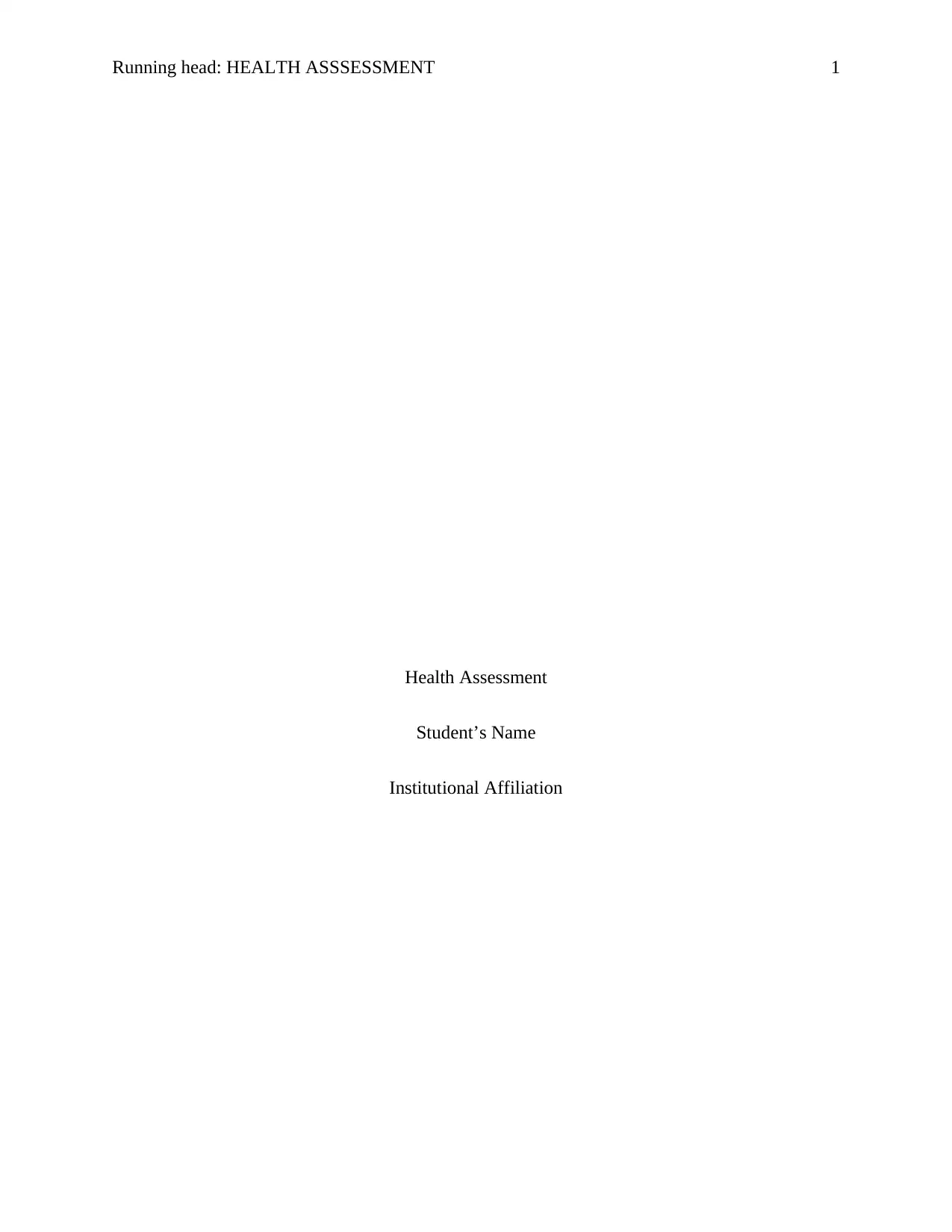
Running head: HEALTH ASSSESSMENT 1
Health Assessment
Student’s Name
Institutional Affiliation
Health Assessment
Student’s Name
Institutional Affiliation
Paraphrase This Document
Need a fresh take? Get an instant paraphrase of this document with our AI Paraphraser
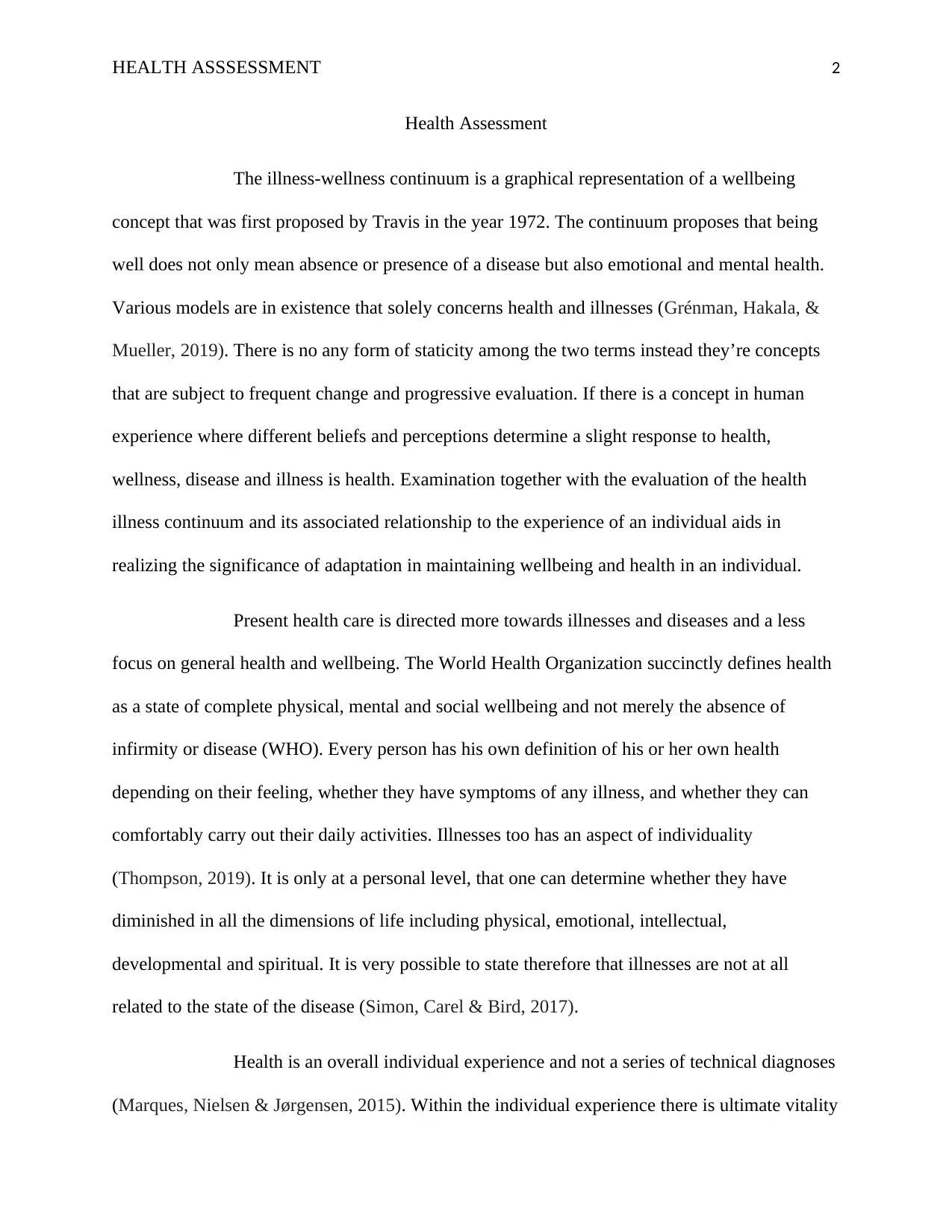
HEALTH ASSSESSMENT 2
Health Assessment
The illness-wellness continuum is a graphical representation of a wellbeing
concept that was first proposed by Travis in the year 1972. The continuum proposes that being
well does not only mean absence or presence of a disease but also emotional and mental health.
Various models are in existence that solely concerns health and illnesses (Grénman, Hakala, &
Mueller, 2019). There is no any form of staticity among the two terms instead they’re concepts
that are subject to frequent change and progressive evaluation. If there is a concept in human
experience where different beliefs and perceptions determine a slight response to health,
wellness, disease and illness is health. Examination together with the evaluation of the health
illness continuum and its associated relationship to the experience of an individual aids in
realizing the significance of adaptation in maintaining wellbeing and health in an individual.
Present health care is directed more towards illnesses and diseases and a less
focus on general health and wellbeing. The World Health Organization succinctly defines health
as a state of complete physical, mental and social wellbeing and not merely the absence of
infirmity or disease (WHO). Every person has his own definition of his or her own health
depending on their feeling, whether they have symptoms of any illness, and whether they can
comfortably carry out their daily activities. Illnesses too has an aspect of individuality
(Thompson, 2019). It is only at a personal level, that one can determine whether they have
diminished in all the dimensions of life including physical, emotional, intellectual,
developmental and spiritual. It is very possible to state therefore that illnesses are not at all
related to the state of the disease (Simon, Carel & Bird, 2017).
Health is an overall individual experience and not a series of technical diagnoses
(Marques, Nielsen & Jørgensen, 2015). Within the individual experience there is ultimate vitality
Health Assessment
The illness-wellness continuum is a graphical representation of a wellbeing
concept that was first proposed by Travis in the year 1972. The continuum proposes that being
well does not only mean absence or presence of a disease but also emotional and mental health.
Various models are in existence that solely concerns health and illnesses (Grénman, Hakala, &
Mueller, 2019). There is no any form of staticity among the two terms instead they’re concepts
that are subject to frequent change and progressive evaluation. If there is a concept in human
experience where different beliefs and perceptions determine a slight response to health,
wellness, disease and illness is health. Examination together with the evaluation of the health
illness continuum and its associated relationship to the experience of an individual aids in
realizing the significance of adaptation in maintaining wellbeing and health in an individual.
Present health care is directed more towards illnesses and diseases and a less
focus on general health and wellbeing. The World Health Organization succinctly defines health
as a state of complete physical, mental and social wellbeing and not merely the absence of
infirmity or disease (WHO). Every person has his own definition of his or her own health
depending on their feeling, whether they have symptoms of any illness, and whether they can
comfortably carry out their daily activities. Illnesses too has an aspect of individuality
(Thompson, 2019). It is only at a personal level, that one can determine whether they have
diminished in all the dimensions of life including physical, emotional, intellectual,
developmental and spiritual. It is very possible to state therefore that illnesses are not at all
related to the state of the disease (Simon, Carel & Bird, 2017).
Health is an overall individual experience and not a series of technical diagnoses
(Marques, Nielsen & Jørgensen, 2015). Within the individual experience there is ultimate vitality
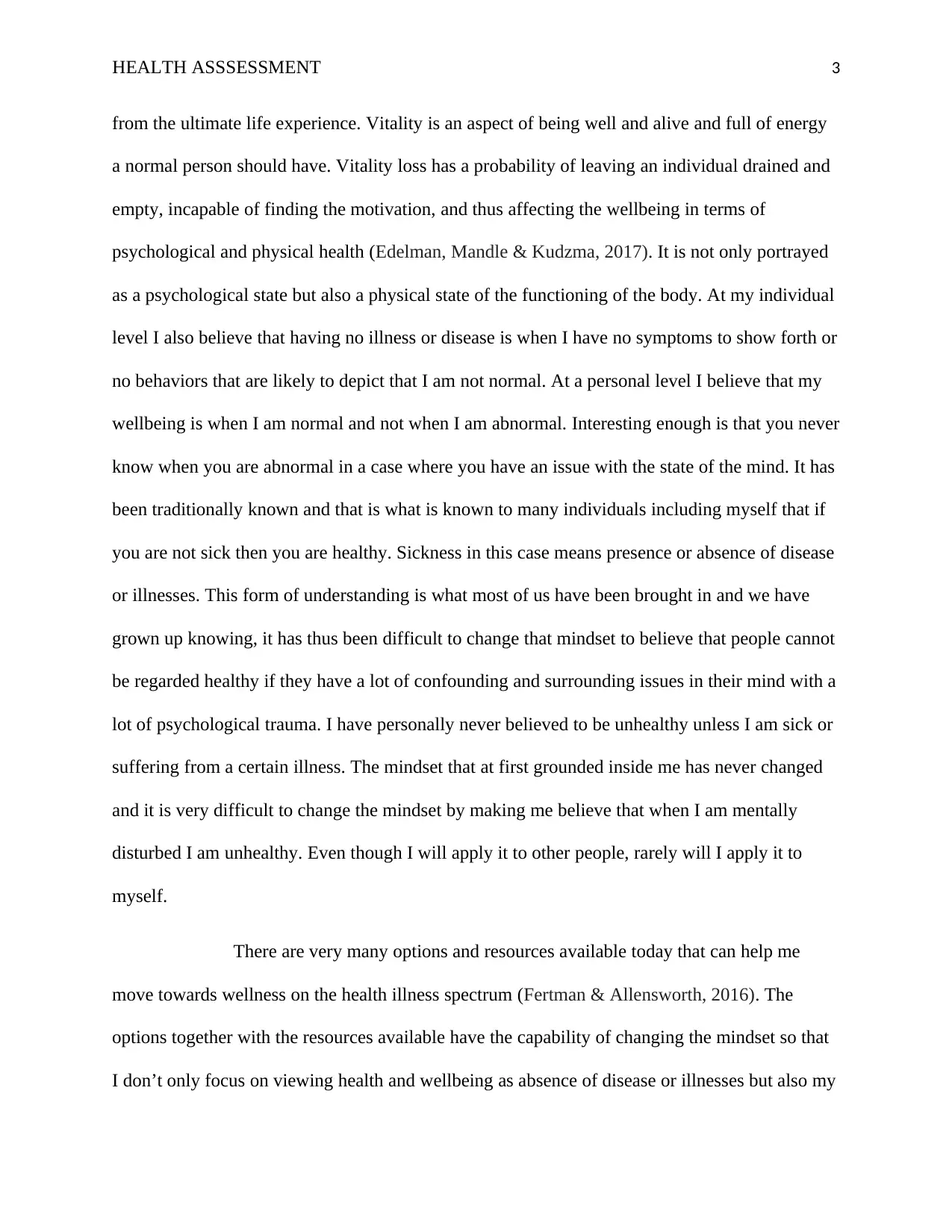
HEALTH ASSSESSMENT 3
from the ultimate life experience. Vitality is an aspect of being well and alive and full of energy
a normal person should have. Vitality loss has a probability of leaving an individual drained and
empty, incapable of finding the motivation, and thus affecting the wellbeing in terms of
psychological and physical health (Edelman, Mandle & Kudzma, 2017). It is not only portrayed
as a psychological state but also a physical state of the functioning of the body. At my individual
level I also believe that having no illness or disease is when I have no symptoms to show forth or
no behaviors that are likely to depict that I am not normal. At a personal level I believe that my
wellbeing is when I am normal and not when I am abnormal. Interesting enough is that you never
know when you are abnormal in a case where you have an issue with the state of the mind. It has
been traditionally known and that is what is known to many individuals including myself that if
you are not sick then you are healthy. Sickness in this case means presence or absence of disease
or illnesses. This form of understanding is what most of us have been brought in and we have
grown up knowing, it has thus been difficult to change that mindset to believe that people cannot
be regarded healthy if they have a lot of confounding and surrounding issues in their mind with a
lot of psychological trauma. I have personally never believed to be unhealthy unless I am sick or
suffering from a certain illness. The mindset that at first grounded inside me has never changed
and it is very difficult to change the mindset by making me believe that when I am mentally
disturbed I am unhealthy. Even though I will apply it to other people, rarely will I apply it to
myself.
There are very many options and resources available today that can help me
move towards wellness on the health illness spectrum (Fertman & Allensworth, 2016). The
options together with the resources available have the capability of changing the mindset so that
I don’t only focus on viewing health and wellbeing as absence of disease or illnesses but also my
from the ultimate life experience. Vitality is an aspect of being well and alive and full of energy
a normal person should have. Vitality loss has a probability of leaving an individual drained and
empty, incapable of finding the motivation, and thus affecting the wellbeing in terms of
psychological and physical health (Edelman, Mandle & Kudzma, 2017). It is not only portrayed
as a psychological state but also a physical state of the functioning of the body. At my individual
level I also believe that having no illness or disease is when I have no symptoms to show forth or
no behaviors that are likely to depict that I am not normal. At a personal level I believe that my
wellbeing is when I am normal and not when I am abnormal. Interesting enough is that you never
know when you are abnormal in a case where you have an issue with the state of the mind. It has
been traditionally known and that is what is known to many individuals including myself that if
you are not sick then you are healthy. Sickness in this case means presence or absence of disease
or illnesses. This form of understanding is what most of us have been brought in and we have
grown up knowing, it has thus been difficult to change that mindset to believe that people cannot
be regarded healthy if they have a lot of confounding and surrounding issues in their mind with a
lot of psychological trauma. I have personally never believed to be unhealthy unless I am sick or
suffering from a certain illness. The mindset that at first grounded inside me has never changed
and it is very difficult to change the mindset by making me believe that when I am mentally
disturbed I am unhealthy. Even though I will apply it to other people, rarely will I apply it to
myself.
There are very many options and resources available today that can help me
move towards wellness on the health illness spectrum (Fertman & Allensworth, 2016). The
options together with the resources available have the capability of changing the mindset so that
I don’t only focus on viewing health and wellbeing as absence of disease or illnesses but also my
⊘ This is a preview!⊘
Do you want full access?
Subscribe today to unlock all pages.

Trusted by 1+ million students worldwide
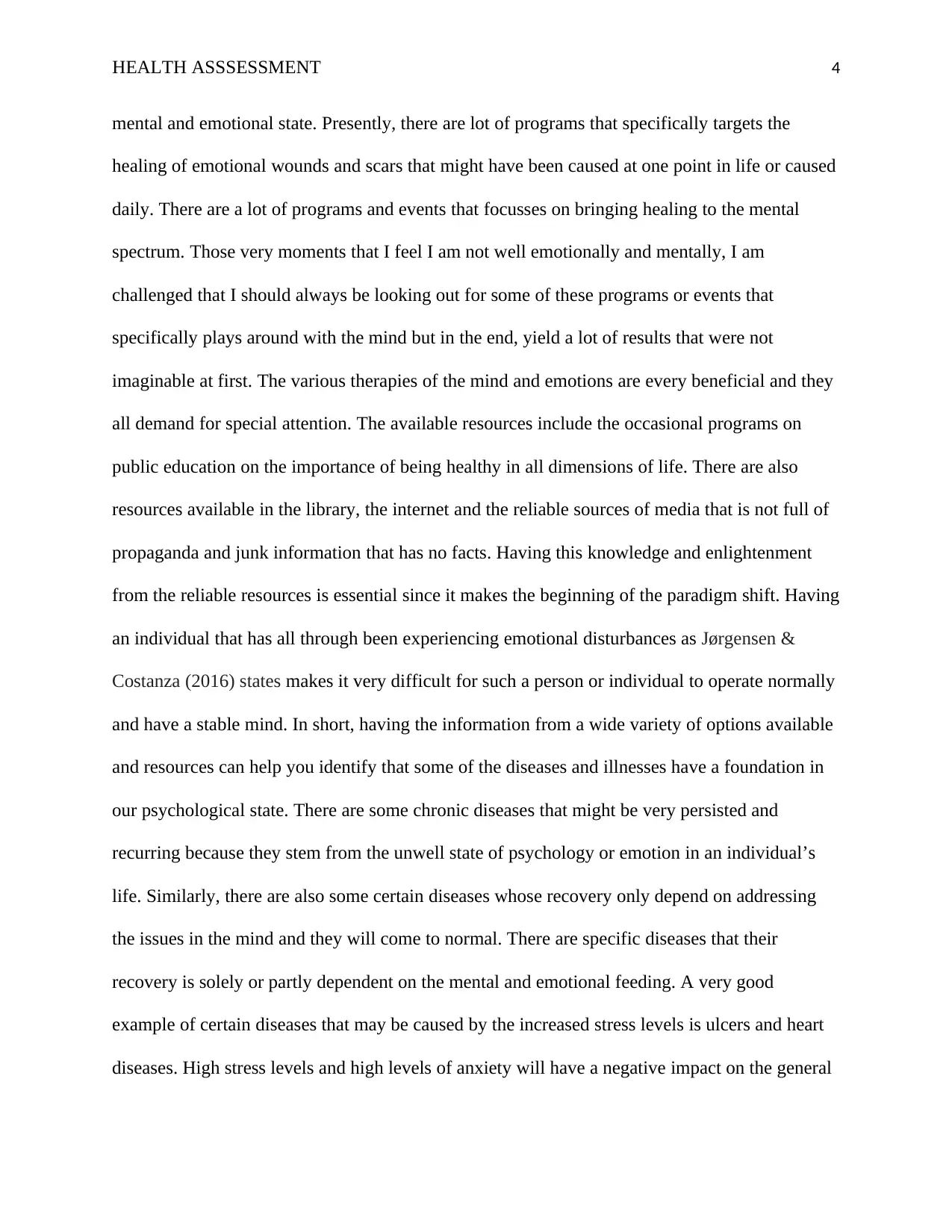
HEALTH ASSSESSMENT 4
mental and emotional state. Presently, there are lot of programs that specifically targets the
healing of emotional wounds and scars that might have been caused at one point in life or caused
daily. There are a lot of programs and events that focusses on bringing healing to the mental
spectrum. Those very moments that I feel I am not well emotionally and mentally, I am
challenged that I should always be looking out for some of these programs or events that
specifically plays around with the mind but in the end, yield a lot of results that were not
imaginable at first. The various therapies of the mind and emotions are every beneficial and they
all demand for special attention. The available resources include the occasional programs on
public education on the importance of being healthy in all dimensions of life. There are also
resources available in the library, the internet and the reliable sources of media that is not full of
propaganda and junk information that has no facts. Having this knowledge and enlightenment
from the reliable resources is essential since it makes the beginning of the paradigm shift. Having
an individual that has all through been experiencing emotional disturbances as Jørgensen &
Costanza (2016) states makes it very difficult for such a person or individual to operate normally
and have a stable mind. In short, having the information from a wide variety of options available
and resources can help you identify that some of the diseases and illnesses have a foundation in
our psychological state. There are some chronic diseases that might be very persisted and
recurring because they stem from the unwell state of psychology or emotion in an individual’s
life. Similarly, there are also some certain diseases whose recovery only depend on addressing
the issues in the mind and they will come to normal. There are specific diseases that their
recovery is solely or partly dependent on the mental and emotional feeding. A very good
example of certain diseases that may be caused by the increased stress levels is ulcers and heart
diseases. High stress levels and high levels of anxiety will have a negative impact on the general
mental and emotional state. Presently, there are lot of programs that specifically targets the
healing of emotional wounds and scars that might have been caused at one point in life or caused
daily. There are a lot of programs and events that focusses on bringing healing to the mental
spectrum. Those very moments that I feel I am not well emotionally and mentally, I am
challenged that I should always be looking out for some of these programs or events that
specifically plays around with the mind but in the end, yield a lot of results that were not
imaginable at first. The various therapies of the mind and emotions are every beneficial and they
all demand for special attention. The available resources include the occasional programs on
public education on the importance of being healthy in all dimensions of life. There are also
resources available in the library, the internet and the reliable sources of media that is not full of
propaganda and junk information that has no facts. Having this knowledge and enlightenment
from the reliable resources is essential since it makes the beginning of the paradigm shift. Having
an individual that has all through been experiencing emotional disturbances as Jørgensen &
Costanza (2016) states makes it very difficult for such a person or individual to operate normally
and have a stable mind. In short, having the information from a wide variety of options available
and resources can help you identify that some of the diseases and illnesses have a foundation in
our psychological state. There are some chronic diseases that might be very persisted and
recurring because they stem from the unwell state of psychology or emotion in an individual’s
life. Similarly, there are also some certain diseases whose recovery only depend on addressing
the issues in the mind and they will come to normal. There are specific diseases that their
recovery is solely or partly dependent on the mental and emotional feeding. A very good
example of certain diseases that may be caused by the increased stress levels is ulcers and heart
diseases. High stress levels and high levels of anxiety will have a negative impact on the general
Paraphrase This Document
Need a fresh take? Get an instant paraphrase of this document with our AI Paraphraser
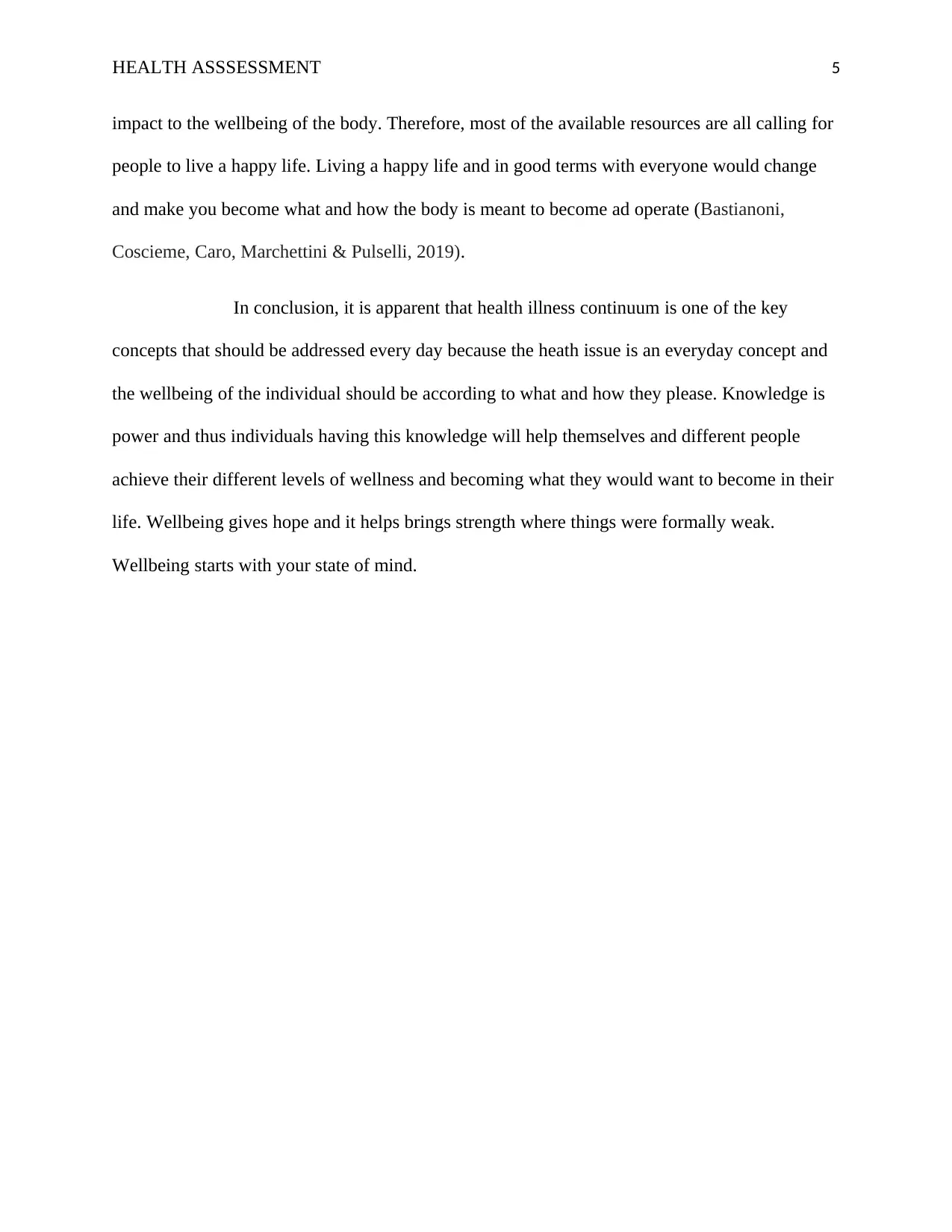
HEALTH ASSSESSMENT 5
impact to the wellbeing of the body. Therefore, most of the available resources are all calling for
people to live a happy life. Living a happy life and in good terms with everyone would change
and make you become what and how the body is meant to become ad operate (Bastianoni,
Coscieme, Caro, Marchettini & Pulselli, 2019).
In conclusion, it is apparent that health illness continuum is one of the key
concepts that should be addressed every day because the heath issue is an everyday concept and
the wellbeing of the individual should be according to what and how they please. Knowledge is
power and thus individuals having this knowledge will help themselves and different people
achieve their different levels of wellness and becoming what they would want to become in their
life. Wellbeing gives hope and it helps brings strength where things were formally weak.
Wellbeing starts with your state of mind.
impact to the wellbeing of the body. Therefore, most of the available resources are all calling for
people to live a happy life. Living a happy life and in good terms with everyone would change
and make you become what and how the body is meant to become ad operate (Bastianoni,
Coscieme, Caro, Marchettini & Pulselli, 2019).
In conclusion, it is apparent that health illness continuum is one of the key
concepts that should be addressed every day because the heath issue is an everyday concept and
the wellbeing of the individual should be according to what and how they please. Knowledge is
power and thus individuals having this knowledge will help themselves and different people
achieve their different levels of wellness and becoming what they would want to become in their
life. Wellbeing gives hope and it helps brings strength where things were formally weak.
Wellbeing starts with your state of mind.
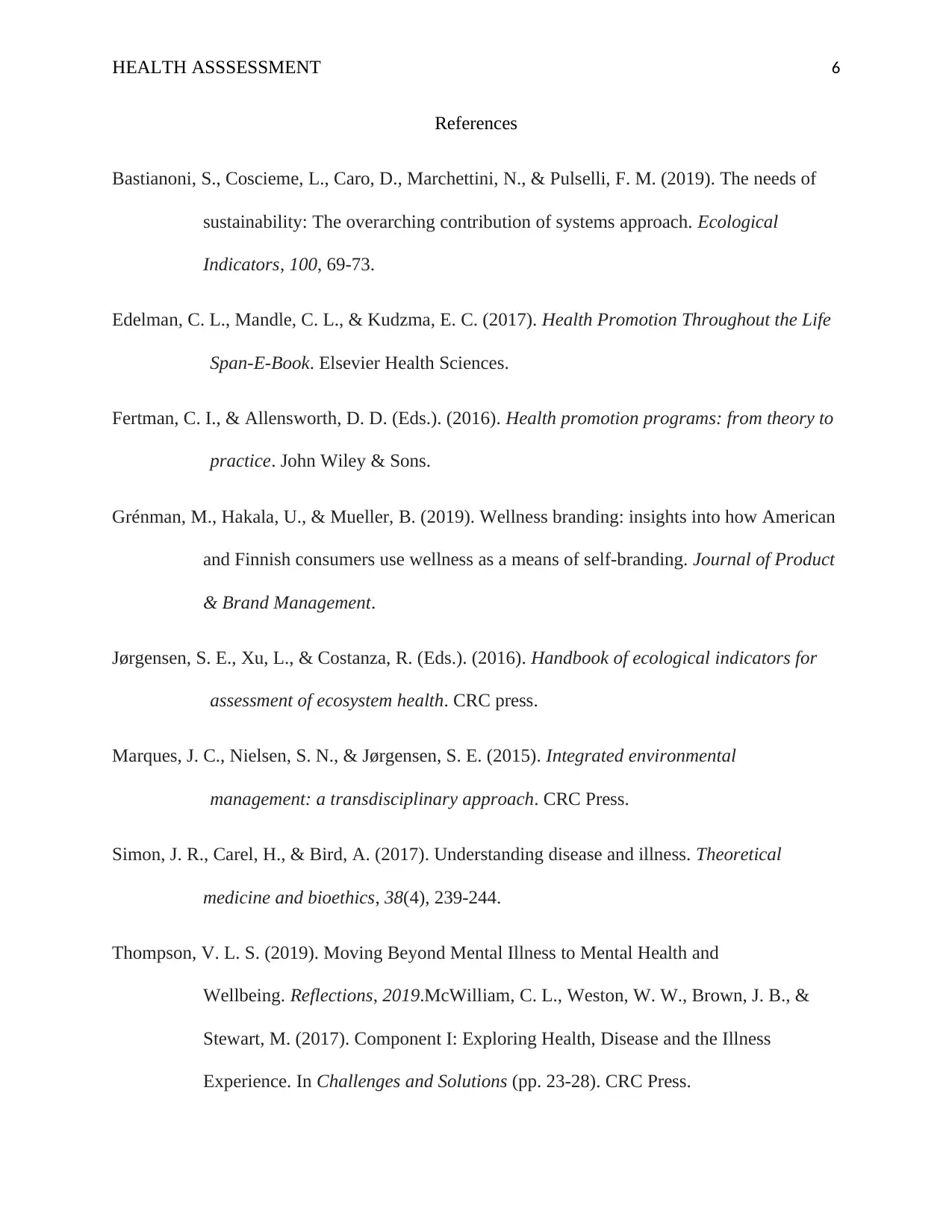
HEALTH ASSSESSMENT 6
References
Bastianoni, S., Coscieme, L., Caro, D., Marchettini, N., & Pulselli, F. M. (2019). The needs of
sustainability: The overarching contribution of systems approach. Ecological
Indicators, 100, 69-73.
Edelman, C. L., Mandle, C. L., & Kudzma, E. C. (2017). Health Promotion Throughout the Life
Span-E-Book. Elsevier Health Sciences.
Fertman, C. I., & Allensworth, D. D. (Eds.). (2016). Health promotion programs: from theory to
practice. John Wiley & Sons.
Grénman, M., Hakala, U., & Mueller, B. (2019). Wellness branding: insights into how American
and Finnish consumers use wellness as a means of self-branding. Journal of Product
& Brand Management.
Jørgensen, S. E., Xu, L., & Costanza, R. (Eds.). (2016). Handbook of ecological indicators for
assessment of ecosystem health. CRC press.
Marques, J. C., Nielsen, S. N., & Jørgensen, S. E. (2015). Integrated environmental
management: a transdisciplinary approach. CRC Press.
Simon, J. R., Carel, H., & Bird, A. (2017). Understanding disease and illness. Theoretical
medicine and bioethics, 38(4), 239-244.
Thompson, V. L. S. (2019). Moving Beyond Mental Illness to Mental Health and
Wellbeing. Reflections, 2019.McWilliam, C. L., Weston, W. W., Brown, J. B., &
Stewart, M. (2017). Component I: Exploring Health, Disease and the Illness
Experience. In Challenges and Solutions (pp. 23-28). CRC Press.
References
Bastianoni, S., Coscieme, L., Caro, D., Marchettini, N., & Pulselli, F. M. (2019). The needs of
sustainability: The overarching contribution of systems approach. Ecological
Indicators, 100, 69-73.
Edelman, C. L., Mandle, C. L., & Kudzma, E. C. (2017). Health Promotion Throughout the Life
Span-E-Book. Elsevier Health Sciences.
Fertman, C. I., & Allensworth, D. D. (Eds.). (2016). Health promotion programs: from theory to
practice. John Wiley & Sons.
Grénman, M., Hakala, U., & Mueller, B. (2019). Wellness branding: insights into how American
and Finnish consumers use wellness as a means of self-branding. Journal of Product
& Brand Management.
Jørgensen, S. E., Xu, L., & Costanza, R. (Eds.). (2016). Handbook of ecological indicators for
assessment of ecosystem health. CRC press.
Marques, J. C., Nielsen, S. N., & Jørgensen, S. E. (2015). Integrated environmental
management: a transdisciplinary approach. CRC Press.
Simon, J. R., Carel, H., & Bird, A. (2017). Understanding disease and illness. Theoretical
medicine and bioethics, 38(4), 239-244.
Thompson, V. L. S. (2019). Moving Beyond Mental Illness to Mental Health and
Wellbeing. Reflections, 2019.McWilliam, C. L., Weston, W. W., Brown, J. B., &
Stewart, M. (2017). Component I: Exploring Health, Disease and the Illness
Experience. In Challenges and Solutions (pp. 23-28). CRC Press.
⊘ This is a preview!⊘
Do you want full access?
Subscribe today to unlock all pages.

Trusted by 1+ million students worldwide
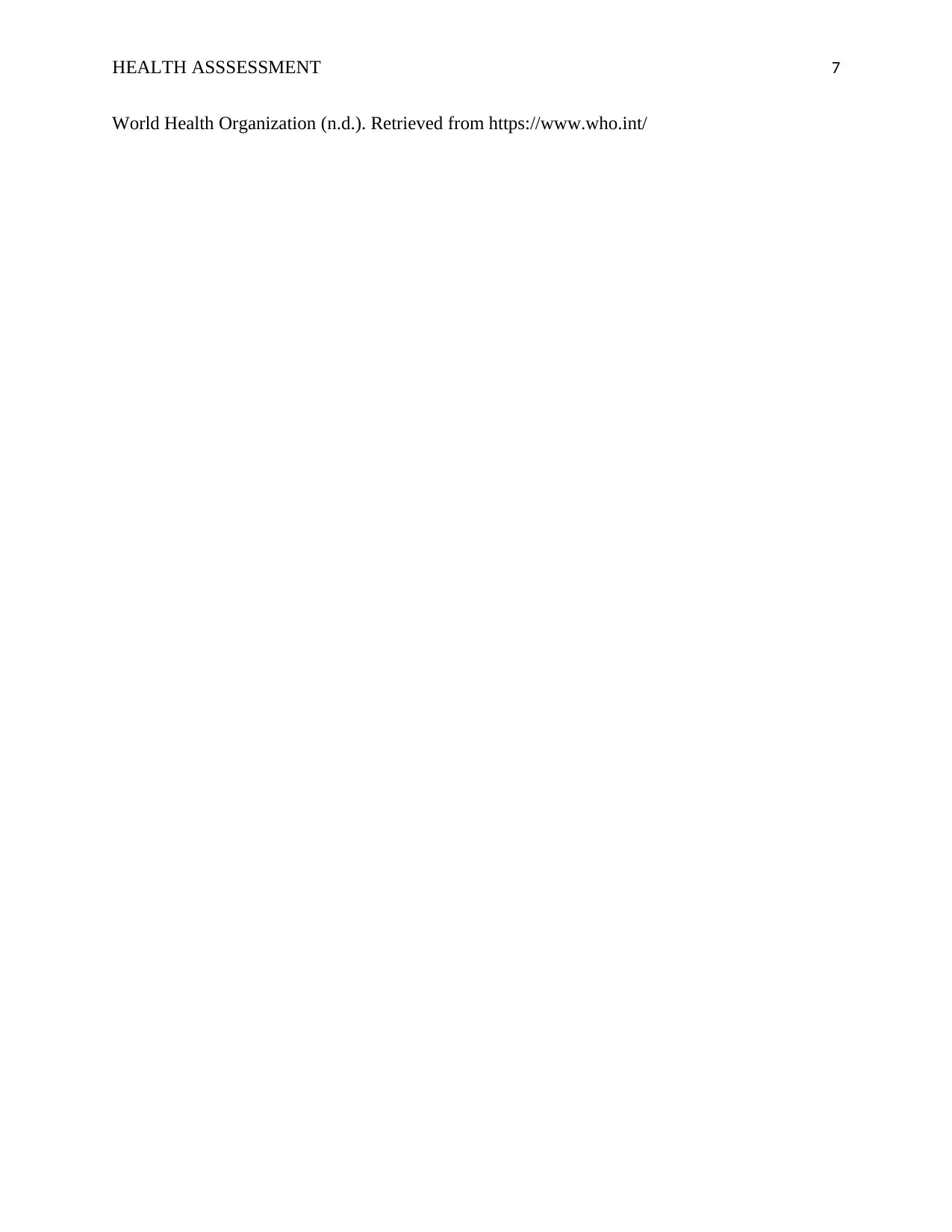
HEALTH ASSSESSMENT 7
World Health Organization (n.d.). Retrieved from https://www.who.int/
World Health Organization (n.d.). Retrieved from https://www.who.int/
1 out of 7
Related Documents
Your All-in-One AI-Powered Toolkit for Academic Success.
+13062052269
info@desklib.com
Available 24*7 on WhatsApp / Email
![[object Object]](/_next/static/media/star-bottom.7253800d.svg)
Unlock your academic potential
Copyright © 2020–2026 A2Z Services. All Rights Reserved. Developed and managed by ZUCOL.




